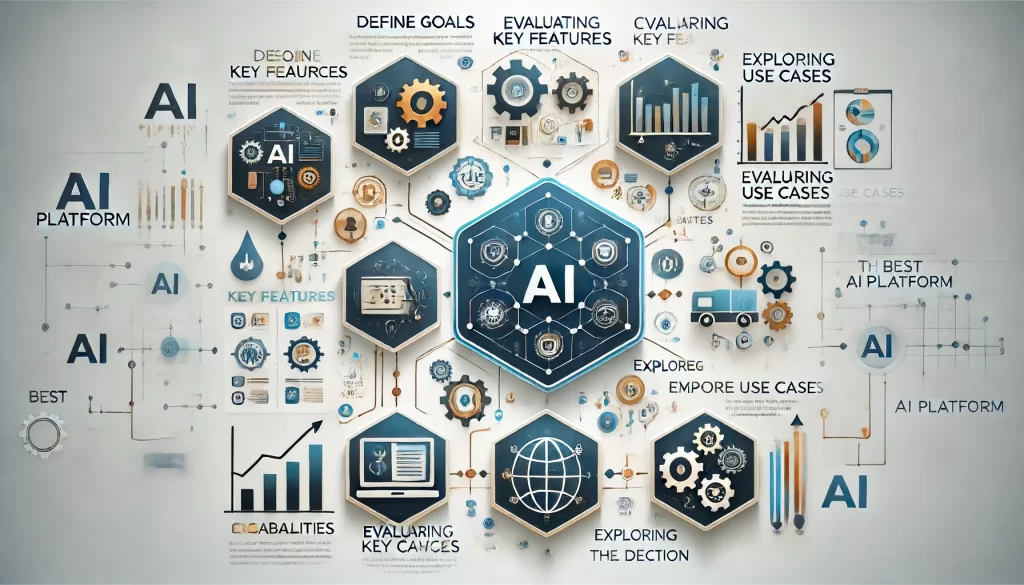
Artificial Intelligence (AI) has become a vital component in enhancing business operations, driving innovation, and gaining a competitive edge. However, with numerous AI platforms available, selecting the right one for your needs can be challenging. This guide will help you understand how to choose the best AI platform to suit your specific requirements.
1. Understanding AI Platforms
AI platforms provide the infrastructure, tools, and services needed to develop, deploy, and manage AI applications. These platforms typically offer a range of features, including machine learning, natural language processing, computer vision, and data analytics. Some of the most popular AI platforms include:
- Google AI Platform: Known for its robust machine learning and data analytics capabilities.
- Microsoft Azure AI: Offers a comprehensive suite of AI tools and services, including cognitive services and machine learning.
- IBM Watson: Renowned for its natural language processing and AI-driven business solutions.
- Amazon Web Services (AWS) AI: Provides a wide array of AI services, including machine learning, computer vision, and speech recognition.
2. Assessing Your AI Needs
Before diving into the specifics of each platform, it’s crucial to assess your own AI needs. Here are some key factors to consider:

Define Your Goals
Determine what you aim to achieve with AI. Are you looking to automate customer service, enhance data analytics, or develop predictive models? Clearly defining your goals will help you identify the features and capabilities you need in an AI platform.
Evaluate Your Resources
Consider your current resources, including your team’s expertise, budget, and available infrastructure. Some platforms may require more technical knowledge or offer more cost-effective solutions, depending on your resources.
Identify Key Features
List the key features and functionalities you need. This could include machine learning, natural language processing, computer vision, or integration capabilities with existing systems. Prioritizing these features will help you narrow down your options.
3. Comparing AI Platform Capabilities
Once you have a clear understanding of your needs, it’s time to compare the capabilities of different AI platforms. Here are some critical aspects to consider:
Machine Learning

Machine learning is a core component of many AI platforms. Evaluate the machine learning capabilities of each platform, including the availability of pre-built models, ease of use, and customization options. Platforms like Google AI and Microsoft Azure AI are known for their robust machine learning tools.
Data Integration
The ability to integrate with your existing data sources is crucial. Look for platforms that support various data formats and can seamlessly connect with your current databases and applications. AWS AI and IBM Watson are noted for their strong data integration capabilities.
Scalability
Consider the scalability of the platform. As your AI needs grow, you’ll want a platform that can scale with your business. Cloud-based platforms like AWS AI and Microsoft Azure AI offer extensive scalability options.
Usability
Usability is another important factor, especially if your team lacks extensive AI expertise. Look for platforms with user-friendly interfaces, comprehensive documentation, and strong customer support. IBM Watson and Google AI Platform are often praised for their ease of use.
4. Evaluating Cost and Return on Investment
Cost is a significant factor when choosing an AI platform. Evaluate the pricing models of different platforms and consider the potential return on investment (ROI).
Pricing Models
AI platforms typically offer various pricing models, including pay-as-you-go, subscription-based, and enterprise licensing. Compare the pricing structures of the platforms you’re considering and choose one that fits your budget and usage patterns.
ROI Considerations
While cost is important, it’s also essential to consider the potential ROI. A more expensive platform may offer better features, support, and scalability, leading to higher long-term returns. Evaluate the platform’s impact on your business goals and weigh this against the cost.
5. Exploring Use Cases and Success Stories
Examining use cases and success stories can provide valuable insights into the practical applications of different AI platforms.
Industry-Specific Solutions
Some AI platforms offer industry-specific solutions tailored to your sector. For example, IBM Watson provides specialized tools for healthcare, finance, and retail. Look for platforms with a proven track record in your industry.
Case Studies
Review case studies and customer testimonials to understand how other businesses have successfully implemented the platform. This can provide a better sense of the platform’s strengths and weaknesses in real-world scenarios.
6. Making the Final Decision
After evaluating your needs, comparing capabilities, considering costs, and exploring use cases, it’s time to make your final decision. Here are some final steps to take:
Trial and Testing
Many AI platforms offer free trials or demo versions. Take advantage of these opportunities to test the platform’s features and performance. This hands-on experience can be invaluable in making your final decision.
Vendor Support and Training
Consider the level of support and training offered by the platform vendor. Comprehensive support and training resources can help your team get up to speed quickly and ensure a smoother implementation process.
Long-Term Partnership
Choosing an AI platform is not just a technical decision; it’s also about forming a long-term partnership. Consider the vendor’s reputation, commitment to innovation, and ability to support your business as it grows.
Conclusion

Choosing the best AI platform requires careful consideration of your specific needs, goals, and resources. By assessing your requirements, comparing platform capabilities, evaluating costs, exploring use cases, and conducting trials, you can make an informed decision that will set your business up for success with AI. As you integrate AI into your operations, you’ll unlock new opportunities for innovation, efficiency, and growth.
4o


